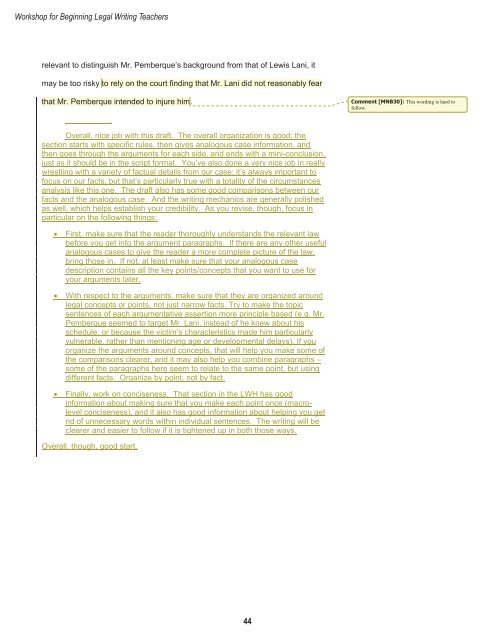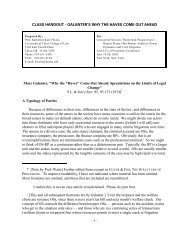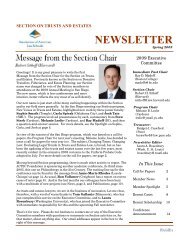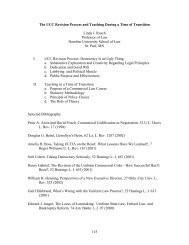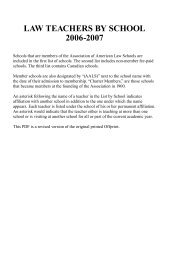Workshop for Beginning Legal Writing Teachers - AALS
Workshop for Beginning Legal Writing Teachers - AALS
Workshop for Beginning Legal Writing Teachers - AALS
You also want an ePaper? Increase the reach of your titles
YUMPU automatically turns print PDFs into web optimized ePapers that Google loves.
<strong>Workshop</strong> <strong>for</strong> <strong>Beginning</strong> <strong>Legal</strong> <strong>Writing</strong> <strong>Teachers</strong><br />
relevant to distinguish Mr. Pemberque’s background from that of Lewis Lani, it<br />
may be too risky to rely on the court finding that Mr. Lani did not reasonably fear<br />
that Mr. Pemberque intended to injure him.<br />
__________,<br />
Overall, nice job with this draft. The overall organization is good; the<br />
section starts with specific rules, then gives analogous case in<strong>for</strong>mation, and<br />
then goes through the arguments <strong>for</strong> each side, and ends with a mini-conclusion,<br />
just as it should be in the script <strong>for</strong>mat. You’ve also done a very nice job in really<br />
wrestling with a variety of factual details from our case; it’s always important to<br />
focus on our facts, but that’s particularly true with a totality of the circumstances<br />
analysis like this one. The draft also has some good comparisons between our<br />
facts and the analogous case. And the writing mechanics are generally polished<br />
as well, which helps establish your credibility. As you revise, though, focus in<br />
particular on the following things:<br />
� First, make sure that the reader thoroughly understands the relevant law<br />
be<strong>for</strong>e you get into the argument paragraphs. If there are any other useful<br />
analogous cases to give the reader a more complete picture of the law,<br />
bring those in. If not, at least make sure that your analogous case<br />
description contains all the key points/concepts that you want to use <strong>for</strong><br />
your arguments later.<br />
� With respect to the arguments, make sure that they are organized around<br />
legal concepts or points, not just narrow facts. Try to make the topic<br />
sentences of each argumentative assertion more principle based (e.g. Mr.<br />
Pemberque seemed to target Mr. Lani, instead of he knew about his<br />
schedule, or because the victim’s characteristics made him particularly<br />
vulnerable, rather than mentioning age or developmental delays). If you<br />
organize the arguments around concepts, that will help you make some of<br />
the comparisons clearer, and it may also help you combine paragraphs –<br />
some of the paragraphs here seem to relate to the same point, but using<br />
different facts. Organize by point, not by fact.<br />
� Finally, work on conciseness. That section in the LWH has good<br />
in<strong>for</strong>mation about making sure that you make each point once (macrolevel<br />
conciseness), and it also has good in<strong>for</strong>mation about helping you get<br />
rid of unnecessary words within individual sentences. The writing will be<br />
clearer and easier to follow if it is tightened up in both those ways.<br />
Overall, though, good start.<br />
44<br />
Comment [MNB30]: This wording is hard to<br />
follow.


